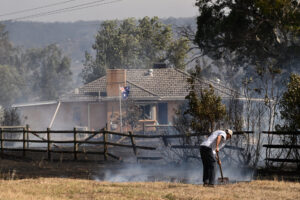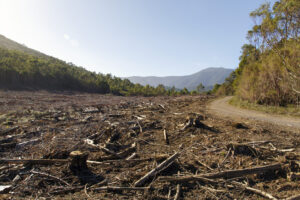by Richard Denniss
[Originally published in the Financial Review, 11 November 2019]
Despite Prime Minister Scott Morrison’s best efforts, Australia has a target of net zero greenhouse gas emissions in 31 years’ time. His suggestions that Labor’s renewable energy target of 50 per cent by 2030 is an economic “wrecking ball” is as pointless and wrong as his claims that pursuing a budget surplus when the economy is stagnating is good for “jobs and growth”.
Whether the Prime Minister likes it or not the Liberal premiers of NSW, South Australia and Tasmania have joined with the Labor leaders in the other states and territories in declaring that their jurisdictions will contribute no greenhouse gases to the world’s atmosphere. These promises are not contingent on what China does, what India does, or whether so-called “clean coal” is invented. No state is planning to rely on nuclear energy to meet their 2050 targets.
But not only does Morrison seem to think that Liberal premiers like Gladys Berejiklian are mere virtue signallers, he also seems to think that he knows more about running a company than the leaders of Australia’s biggest businesses.
Every business operating in Australia is operating in a jurisdiction with the stated goal of net zero emissions and, in turn, it falls on responsible business leaders to plan for a future that they expect rather than talk about the future they would like. Put simply, CEOs of companies with assets that will be operating in 2050 and do not have plans to reduce their emissions are not protecting their shareholders’ value.
AGL, owner of enormous coal-fired power stations including Bayswater in NSW and Loy Yang A in Victoria, has committed to closing its entire coal-fired power generation fleet by 2050. Qantas has committed to be net zero by 2050 and BHP, the world’s largest mining company, now concedes that, because greenhouse gas emissions don’t stop at borders, coal producers need to work with coal customers to reduce emissions.
And it’s not just big fossil fuel users that are planning for the future. Around Australia and across the world, the banking industry, insurance industry and property industry are factoring in sea level rises, more storms and more bushfires. While the Deputy Prime Minister of Australia thinks that it is “woke” to link climate change and catastrophic bushfires, the global guardians of our wealth think it is simply wise.
Given that ministers in the federal government don’t heed their own departmental advice that Australia’s greenhouse gas emissions are rising and that Australia is not on track to meet our Paris Agreement targets, it should come as no surprise that federal government ministers don’t know about – or don’t believe – the Australian Bureau of Meteorology when they say that climate change is making bushfires worse in Australia.
But state premiers and corporate CEOs don’t have the luxury that federal ministers have to pontificate irrelevantly about their beliefs. The premiers must decide whether to allocate more resources to firefighting and emergency services or not. Insurance companies must decide whether to insure homes in North Queensland against storms or not.
After each mass shooting in the United States, the gun lobby argues that it is inappropriate to talk about gun reform. And after the funerals, when it becomes “appropriate”, they then argue that it is irrelevant.
According to the government’s own data, Australia’s emissions are rising, our fossil fuel exports are rising, and average temperatures are rising. Federal ministers with no responsibility for planning for emergencies are, of course, completely free to ignore that science and send thoughts and prayers. But state ministers and corporate CEOs do not have that luxury.
As Sydney braces for its first day of catastrophic fire danger, our rivers literally run dry and another summer of record heat is forecast, the costs of climate change are becoming abundantly clear. While state Liberals and the business community admit the need to rapidly decarbonise, the federal government is inquiring into where to build new coal-fired power stations and the potential for nuclear power.
The Prime Minister talks endlessly about the so-called “Canberra Bubble”, but that’s the only place his views on climate change are taken seriously.
Richard Denniss is chief economist at The Australia Institute @RDNS_TAI
Between the Lines Newsletter
The biggest stories and the best analysis from the team at the Australia Institute, delivered to your inbox every fortnight.
You might also like
Why a fossil fuel-free COP could put Australia’s bid over the edge
When the medical world hosts a conference on quitting smoking, they don’t invite Phillip Morris, or British American Tobacco along to help “be part of the solution”.
Burning homes and rising premiums: why fossil fuel companies must pay the bill
Another summer, another round of devastation: homes lost, communities evacuated, lives upended.
Five priorities for the next parliament if we want a liveable Australia
Climate and nature crises won’t pause while politics plays out.



